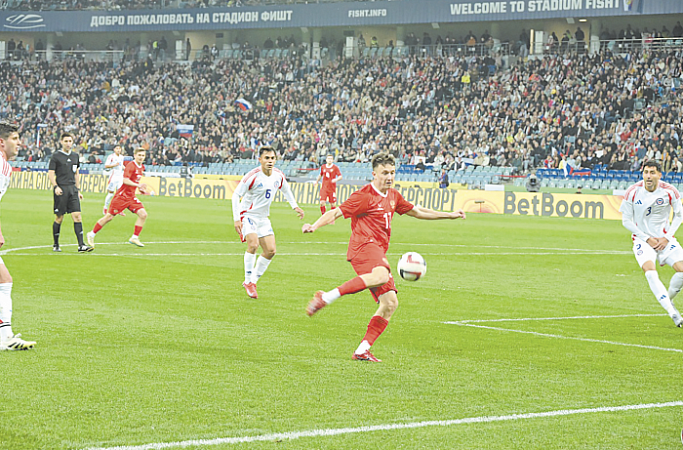More than 30,000 fans from Sochi and across the country have reportedly attended the Russia-Chile football match.
The friendly took place at the Fisht Stadium. The South American team won 2-0. In the first half, forward Gonzalo Tapia opened the scoring. In the second half, substitute striker Ben Brereton Díaz doubled the visitors’ lead.
“At the legendary Fisht Stadium we witnessed a true football celebration. More than 30,000 fans from Sochi, Krasnodar Krai and other regions of Russia came with their families to support the national team. Great attention was paid to transport logistics and security during preparations and on match day. Our next international match will be held on 18 November, when Chile and Peru meet in a friendly at Fisht.”
The match against Chile was the second game for the Russian national team during the November international break. On 12 November in St Petersburg, the team played a friendly against Peru, ending in a 1-1 draw.
Fisht Stadium
Fisht Stadium is an Olympic venue located in Sochi, Russia, constructed for the 2014 Winter Olympics and Paralympics, where it hosted the opening and closing ceremonies. Named after the nearby Fisht Mountain, whose name means “white head” in the Adyghe language, the stadium was later repurposed as a central venue for the 2018 FIFA World Cup. Its distinctive design is inspired by the snowy peaks of the Caucasus Mountains and a Fabergé egg.
Sochi
Sochi is a major resort city on the Black Sea coast in Russia’s Krasnodar Krai, often called the “summer capital” of Russia. It gained international prominence after hosting the 2014 Winter Olympics, which led to significant modern development. Historically, its subtropical climate has made it a popular health and beach resort since the Soviet era.
Krasnodar Krai
Krasnodar Krai is a federal subject and a popular tourist region in southern Russia, often referred to as Kuban. Historically, it was a Cossack territory and is known for its fertile black soil and agricultural production. Key attractions include the resort city of Sochi on the Black Sea coast and its rich Cossack cultural traditions.
Russia
Russia is a vast transcontinental nation with a rich history spanning over a millennium, founded in the 9th century with the establishment of the Kievan Rus’ state. It grew into a major global power, first as the Tsardom of Russia and later the Russian Empire, before becoming the core of the Soviet Union in the 20th century. Today, it is known for its diverse cultural heritage, from the ornate domes of St. Basil’s Cathedral in Moscow to the imperial grandeur of St. Petersburg.
Chile
Chile is a long, narrow South American nation stretching along the Pacific coast, bordered by the Andes mountains. Its history includes centuries of Inca influence in the north, followed by Spanish colonization beginning in the 16th century, until it gained independence in the early 19th century. The country is renowned for its diverse landscapes, ranging from the Atacama Desert to the Patagonian ice fields, and a vibrant cultural identity shaped by its indigenous roots and European heritage.
Peru
Peru is a South American country renowned for the ancient Inca citadel of Machu Picchu, a 15th-century architectural marvel nestled in the Andes Mountains. Its history spans millennia, with complex pre-Columbian cultures like the Norte Chico civilization—one of the oldest in the world—and later the vast Inca Empire, before being conquered by the Spanish in the 16th century. Today, its landscape encompasses a rich tapestry of indigenous and colonial heritage, from the Amazon rainforest to the coastal capital of Lima.
St Petersburg
St. Petersburg is a historic Russian port city founded in 1703 by Tsar Peter the Great as his “window to the West.” It served as the imperial capital of Russia for over two centuries and is renowned for its grand Baroque and Neoclassical architecture, including the Winter Palace and the State Hermitage Museum. Often called the “Venice of the North” for its intricate network of canals and bridges, the city’s historic center is a UNESCO World Heritage Site.
Russian national team
The Russian national team refers to the country’s official representation in international sports competitions, governed by the Russian Olympic Committee. Following a 2019 doping scandal that led to a ban on using its flag and anthem, the team competed under the “ROC” designation from 2021-2022. This period marked a unique chapter in its history of international athletic participation.






